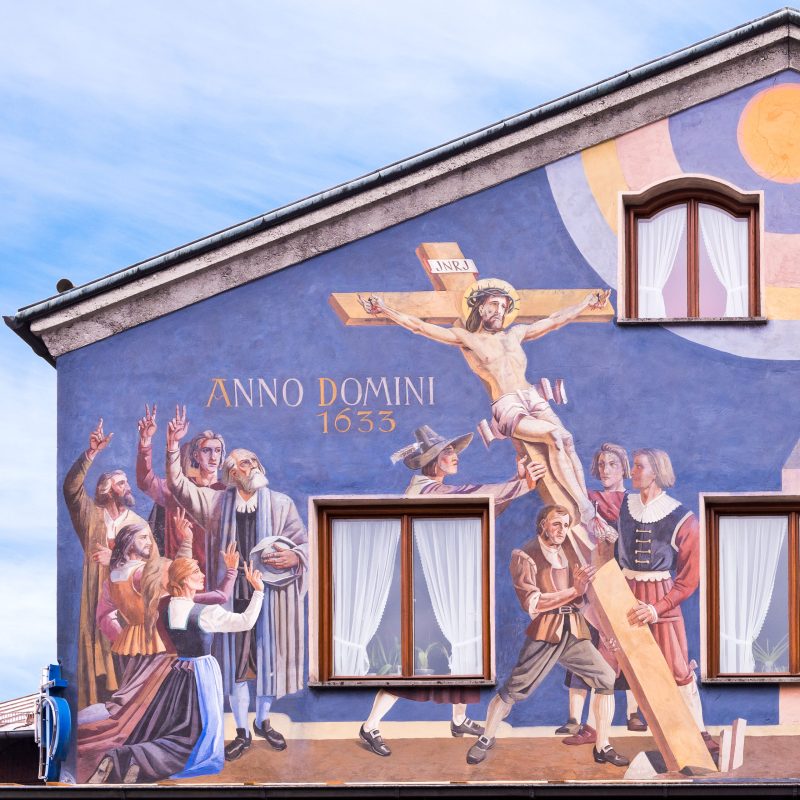
Imagine that you’re living in a tiny German town in 1633 when news comes that the Bubonic plague is racing through Europe, leaving millions dead and cities decimated. Knowing that your village is in the path of this destruction, and that some of your friends and neighbors have already become sick, what would you do? To whom would you go for help to avoid the deadly epidemic?
Videos by TravelAwaits
The people of Oberammergau, Germany, once faced this horror, and the entire community turned to God for deliverance. The residents of the Bavarian village made a vow that if their town was spared obliteration by the plague, they would give thanks every 10 years by reenacting the suffering, death, and resurrection of Jesus Christ.
From that moment on, no one in Oberammergau succumbed to the plague. In 1634, the residents honored their promise with the first reenactment of the Passion of Christ. Ever since, from generation to generation, the play has been performed, and 2022 (a COVID postponement from 2020) marked the 42nd production of the now-famous Oberammergau Passion Play. The next performance will be in 2030.

The people of Oberammergau originally performed the play in the parish church. The audience grew, so they moved to the church graveyard. By the 18th century, even the graveyard was too small, so they moved to a nearby field, building a new stage for each performance. Toward the end of the 19th century, a permanent open-air theater was constructed, which has since been enlarged and modernized. The current theater can accommodate more than 5,000 people. The daylong event takes place from May through October, and hundreds of thousands attend.
Some 2,000 residents of the village take part in the play. Only residents may participate, and rehearsals and preparations are conducted for nearly a year prior to the public presentations. On Ash Wednesday, the men of the town grow out their hair and beards to lend authenticity to their roles. Those who do not appear on stage provide support as crew members, costumers, or stagehands or take on other roles to ensure a successful season. Music plays a powerful role in the production and a full orchestra and choir bring it to life. Those who are not directly involved in the play are busy operating shops, restaurants, hotels, and other businesses to accommodate visitors from around the world.

What To Expect From A Trip To Oberammergau
Oberammergau is a Bavarian village of some 5,000 residents located about 50 miles south of Munich. The facades of many of the village’s buildings are painted with frescoes called Lüftlmalerei. A bit of mystery surrounds the name. One theory is that the originator of the paintings, Franz Seraph Zwinck, was known as the Lüftlmaler, or “air painter.” Another theory is that Zwinck had to work quickly because the fresh air made the paint dry rapidly. Whatever the reason, the beautiful artwork that adorns the buildings often depicts events portrayed in the Passion Play. It gives the town a fairy-tale quality and reminds passersby of the village’s deliverance and its promise to God.
Oberammergau is also well known for its woodcarving heritage. Many recently carved figurines are sold in shops around town, and historical examples of the craft are on display at the Oberammergau Museum, which also offers tours of the Passion Play Theater. One of the favorite activities of playgoers is looking through all of the Nativity carvings in the shops during the play’s intermission.

We went to see the Oberammergau Passion Play in 2010. The small town was full of activity, and there were people everywhere. We attended a performance in June, when the weather was quite comfortable. It got cool in the evenings, so we brought jackets with us, and they came in handy during the later hours of the performance.
The play itself took place in two parts. Everyone left the theater for dinner during the 3-hour intermission. You can arrive earlier and walk around the town a bit before finding your way to the theater, but plan to hit the sack once the play is over.
The plot covers everything from Jesus’s entrance to Jerusalem to his resurrection. Important events such as the Last Supper and Jesus’s arrest, interrogation, condemnation, and crucifixion are portrayed. The performers speak in German, but you can buy an English translation of the text to follow along. The play’s text evolves from production to production as does the music, which forms an integral part of the experience.
Between scenes, live actors make tableaux vivants, or “living images,” motionless representations of biblical events. Accompanied by music, these are intended to provide time for contemplation.

During the intermission, you will need to have a meal. There are several establishments in the village that cater to the large crowds. Each one has its own character, but all are part of the Passion Play experience. We ate at the Ammergauer Haus, a community center that was set up to serve a full German meal. We sat at large tables with other playgoers and exchanged pleasantries as best we could, since people spoke various languages. The menu offered soup and salad to start. Entrées included roast beef, wild salmon, and Bavarian dumplings. For dessert, there was warm apple strudel with custard or red fruit jelly with whipped cream. Beverages included German beer, international wines, and soft drinks. It was a fun experience, though a bit odd having so many people in the same space at one time.
The Passion Play is not only a theatrical masterpiece, but a unique cultural experience, a chance to get a sense of the mystery and history of this event. Seeing the sun set and the moon rise behind the stage is affecting. Add to that the live animals and hundreds of people reenacting events as their ancestors have for some 400 years, and it’s hard to remain unmoved by the experience. To be honest, we were tired after such a long day. But we would recommend the experience to anyone who asks if they should go.
While the Passion Play is an incredible experience, the town of Oberammergau is also full of history and magic. Visiting the shops and watching the townspeople deal with the onslaught of visitors can be an enlightening experience. Thinking about the history of the play, the promise that the current residents’ ancestors made, and the fact that several hundred years later they continue to honor that promise is humbling. We enjoyed the time we spent meeting the townspeople, whose shops were full of goods for people from all over the world to take home with them. We recommend that you take at least a little time to get a sense of these special people with such a unique heritage.

Planning A Visit To Oberammergau
It’s never too early to start saving for the 2030 event. Numerous tourism organizations can provide you with a package that includes accommodations, tickets to the play, and meals. We went that route, and it made things much easier. People plan a year or more in advance to get the tickets and itinerary they want, so start planning early!
The town itself is a lovely village, though quite busy during the Passion Play season. Attending the play is a major commitment, but if the idea appeals to you, then you will not want to miss it. It is a truly mystical experience that will stay with you for a lifetime.
Explore more of TravelAwaits’ Germany content:

